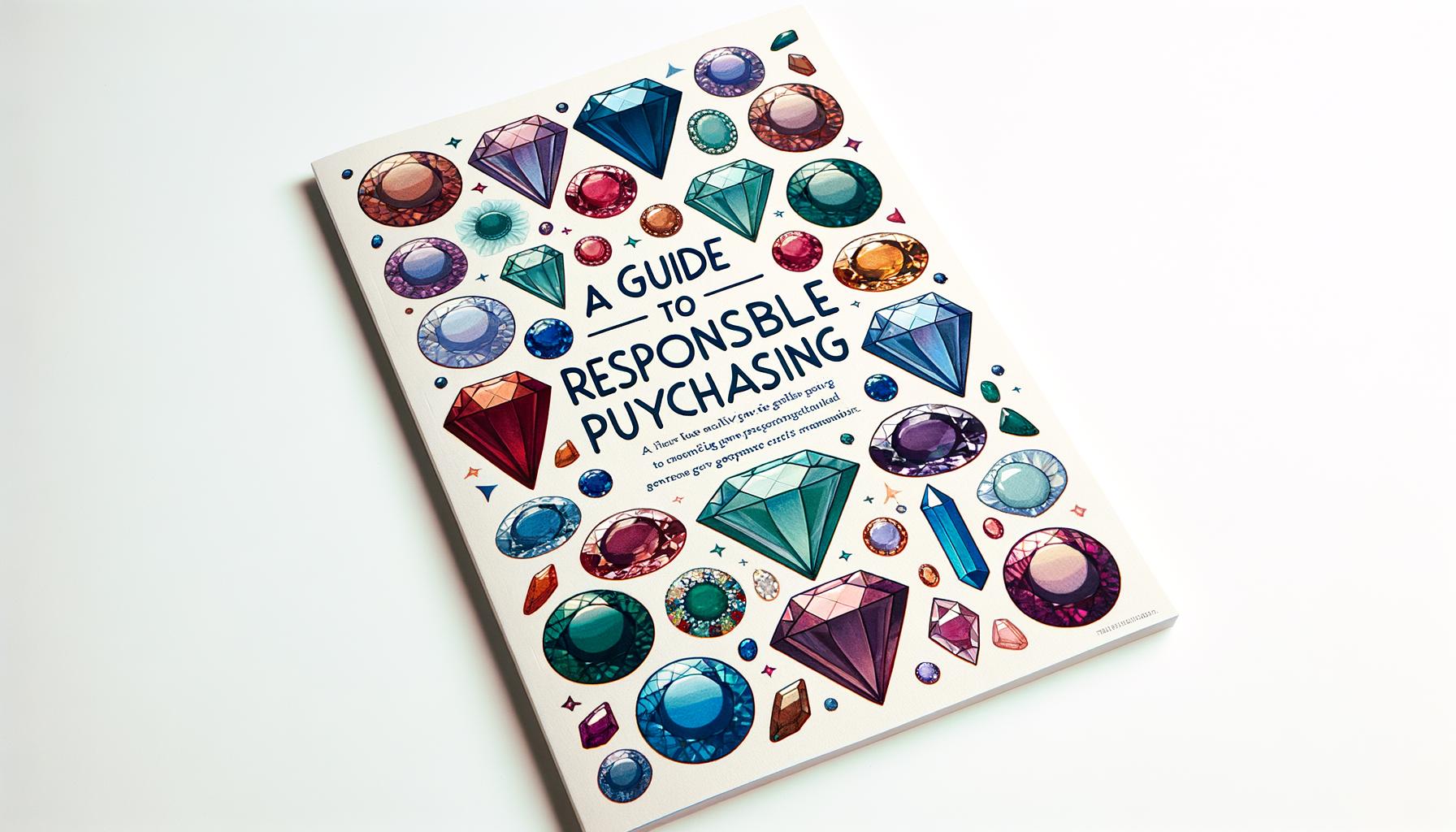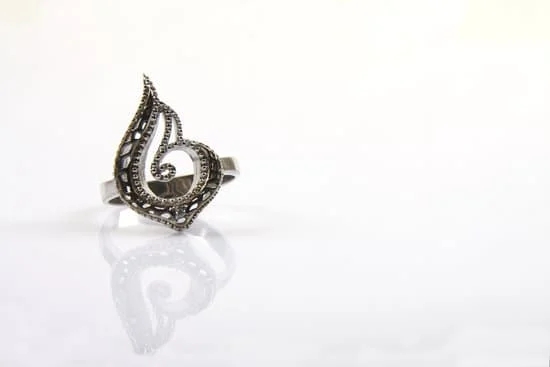In today’s global market, the concept of ethically sourced gemstones: a guide to responsible purchasing has become increasingly significant. Consumer awareness about ethical and sustainable practices is growing exponentially, influencing buying behaviors across a variety of industries, including the jewelry sector. As more people seek to align their purchases with their values, ethically sourced gemstones have emerged as a focal point for conscientious consumers.
Ethically sourced gemstones refer to gems that have been mined and processed in ways that adhere to high standards of environmental and social responsibility. This means minimizing ecological damage, ensuring fair labor practices, promoting safe working conditions, and contributing positively to local communities. With unethical gemstone mining being associated with child labor, environmental degradation, hazardous working conditions, and often exploitative practices, it’s no wonder that consumers are eager to make more informed choices.
Understanding what constitutes an ethically sourced gemstone is crucial for any responsible consumer. Unlike traditionally mined gemstones that may come from dubious sources with murky supply chains, ethically sourced gems can offer peace of mind along with beauty and rarity. By opting for ethically sourced stones, buyers do not just invest in jewelry; they also support sustainable practices and contribute toward creating a better world.
The Dark Side of Gemstone Mining
Environmental Consequences
The environmental ramifications of unethical gemstone mining are severe and far-reaching. Many mining operations involve open-pit mining techniques, which lead to extensive land degradation and deforestation. By stripping away large swathes of earth, these practices disrupt ecosystems and lead to the loss of biodiversity. Rivers and streams often become polluted with toxic runoff from mining activities, endangering local wildlife and contaminating drinking water supplies for surrounding communities.
Social Exploitation
One of the most troubling aspects is the exploitation of labor in gemstone mines. Unregulated mining operations frequently employ child laborers who work long hours under hazardous conditions for meager wages. These children are deprived of education and a safe environment, perpetuating cycles of poverty within their communities. Moreover, adult workers commonly face poor working conditions, including inadequate safety measures that expose them to physical harm and chronic health issues.
Real-Life Case Studies
Numerous real-life case studies illustrate the dark side of gemstone mining. In Madagascar, for example, reports have documented rampant child labor in sapphire mines where children endure grueling workdays without proper protective gear.
Similarly, in Myanmar’s jade mines, adults often toil under dangerous conditions with little regard for their well-being, resulting in frequent accidents and fatalities. Ethically sourced gemstones: a guide to responsible purchasing is essential for mitigating such adverse impacts by promoting fair labor standards and environmentally sound practices.
Understanding these issues underscores the importance of shifting toward ethically sourced alternatives and supporting initiatives like Fairtrade or Fairmined certifications that aim to improve working conditions and protect our planet’s ecological balance.
What Are Ethically Sourced Gemstones?
Ethically sourced gemstones represent an important shift in the gemstone industry, focusing on sustainability and social responsibility. These gemstones are mined, processed, and sold in a manner that prioritizes environmental protection, fair labor practices, and community well-being. At its core, ethically sourced gemstones aim to minimize harm while maximizing benefits for all stakeholders involved in their production. This approach stands in stark contrast to traditional mining practices that often lead to ecological degradation and human rights abuses.
Fair Labor Practices
One of the primary criteria for a gemstone to be considered ethically sourced is adherence to fair labor practices. This involves ensuring that workers receive fair wages, work under safe conditions, and have access to necessary benefits. Unlike many conventional mines where child labor and unsafe environments are rampant, ethical mines operate under strict guidelines to protect their workforce.
Fairtrade initiatives often oversee these operations, ensuring compliance with international labor standards. By choosing such gemstones, consumers can actively combat exploitative practices and contribute to community upliftment.
Environmental Sustainability
Another critical aspect of ethically sourced gemstones is environmental sustainability. Traditional gemstone mining can cause severe damage to ecosystems through deforestation, soil erosion, and contamination of water bodies with toxic chemicals like mercury and cyanide. In contrast, responsible mines employ eco-friendly techniques such as reduced chemical use or alternative mining methods that limit environmental impact. For instance, some operations opt for small-scale artisanal mining methods that cause less disruption compared to large-scale industrial mining.
Differentiating Between Ethically Sourced and Traditional Gemstones
Understanding the distinction between ethically sourced gemstones: a guide to responsible purchasing can significantly influence consumer decisions. While both may appear similar in terms of beauty and quality at first glance, their origins tell vastly different stories.
Ethically sourced gemstones come with transparency about their journey from mine to market, often accompanied by certifications that authenticate their provenance according to strict ethical standards. On the other hand, traditional gemstones might lack such traceability features but still present potential ethical dilemmas given the opaque nature of their supply chains.
By recognizing these differences and opting for ethically sourced options, consumers can play a pivotal role in fostering a more sustainable future for the gemstone industry.
Certifications and Standards to Look For
When it comes to ensuring that a gemstone is ethically sourced, certifications and standards play a crucial role. These certifications provide consumers with the assurance that the gemstones they purchase meet stringent ethical criteria, including fair labor conditions and environmental sustainability. One of the most widely recognized certifications is Fairtrade, which guarantees that miners receive fair wages, work under safe conditions, and contribute to their communities’ welfare. This certification also emphasizes minimizing environmental impact through sustainable mining practices.
Another significant certification in the realm of ethically sourced gemstones is Fairmined. Like Fairtrade, Fairmined focuses on improving social outcomes for miners by ensuring fair compensation and promoting gender equality in mining communities. Additionally, it requires compliance with strict environmental standards to reduce ecological degradation. The Fairmined label assures consumers that their gemstone purchases contribute positively to both human lives and the planet.
One of the industry’s broadest-reaching organizations is the Responsible Jewellery Council (RJC). This body sets comprehensive standards covering human rights, labor rights, environmental impact, and business ethics across the entire jewelry supply chain-from mines to retail stores.
RJC-certified companies must undergo rigorous third-party audits to ensure compliance with these high standards. Being aware of these certifications can empower consumers making ethically sourced gemstones: a guide to responsible purchasing by providing them with concrete benchmarks for evaluating gemstone provenance.
| Certification | Main Focus Areas |
|---|---|
| Fairtrade | Fair wages, safe working conditions, community welfare |
| Fairmined | Fair compensation, gender equality, environmental sustainability |
| Responsible Jewellery Council (RJC) | Human rights, labor rights, environmental impact, business ethics |
Understanding these certifications allows consumers to make informed decisions about their gemstone purchases while supporting ethical practices within the industry.
Responsible Mining Practices and Their Benefits
Responsible mining practices are becoming increasingly prevalent as consumers demand more ethical and sustainable options. These practices encompass a variety of methods designed to mitigate the environmental impact of mining while improving the living conditions of workers. One significant approach is the implementation of fair labor standards, ensuring that miners receive adequate wages, benefits, and safe working environments. This minimizes exploitation and helps uplift local communities by providing stable employment opportunities.
Environmental sustainability is also a cornerstone of responsible mining. Techniques such as reduced chemical use, recycling water in processing plants, and restoring mined lands to their natural state are vital. These practices aim to minimize ecological degradation, preserving biodiversity and ensuring that mined areas can recover after operations cease. A prime example is the Gemfields company, known for its commitment to minimal environmental impact and community engagement around its mines in Zambia.
The benefits of responsible mining extend beyond ethical considerations; they positively impact local economies and global supply chains. Ethical mining operations often invest in community development projects, including healthcare facilities, schools, and infrastructure development. For example:
- Empowering local businesses through partnerships.
- Launching educational programs for miners’ children.
- Supporting agricultural initiatives to diversify local economies.
These practices not only enhance the quality of life for those directly involved but also foster goodwill between mining companies and host communities. Understanding these aspects aligns with “ethically sourced gemstones: a guide to responsible purchasing,” emphasizing why consumers should prioritize ethically sourced gemstones when making their purchases.
Finding Ethical Retailers and Jewelers
When searching for ethical retailers and jewelers, the first step is thorough research. Look for businesses that openly share their sourcing practices and commitment to ethical standards. Websites, social media pages, and customer reviews can provide valuable insights into a retailer’s dedication to ethically sourced gemstones: a guide to responsible purchasing will often highlight businesses known for their transparency and accountability.
To vet a jeweler effectively, don’t hesitate to ask specific questions about the origins of their gemstones. Some pertinent inquiries include:
- Where do your gemstones come from?
- Can you provide certification or documentation proving they are ethically sourced?
- What measures does your company take to ensure fair labor practices?
Reputable jewelers are typically more than willing to address these concerns and offer detailed answers.
For those seeking verified sources of ethically sourced gemstones, several well-regarded retailers stand out. Brands such as Brilliant Earth, Cred Jewellery, and Fair Trade Jewelry Company have established reputations for selling stones that meet rigorous ethical standards. These companies not only verify the provenance of their gems but also contribute positively to communities involved in gemstone mining. Choosing such retailers can ensure that your purchase supports responsible mining initiatives while allowing you to enjoy beautiful, conflict-free jewelry.
Alternatives to Mined Gemstones
The modernization of the gemstone industry has given rise to numerous alternatives to traditional mined gemstones, providing consumers with options that are both environmentally friendly and ethically sound. One significant alternative is lab-grown gemstones.
Produced in controlled environments using advanced technological processes, these stones possess the same physical, chemical, and optical properties as their naturally occurring counterparts. The key distinction lies in their origin-lab-grown gemstones are created without damaging ecosystems or contributing to unethical labor practices, thereby aligning perfectly with the principles outlined in this guide to responsible purchasing.
Recycled gemstones offer another compelling alternative for conscientious consumers. These stones involve reusing gemstones that have already been extracted and fashioned into jewelry pieces. By refurbishing older items or incorporating fragments from pre-existing gems into new designs, jewelers can reduce the need for additional mining activities.
This not only preserves natural landscapes but also minimizes the carbon footprint associated with gemstone transportation and processing. Many vintage jewelry aficionados value recycled gemstones for their unique charm and historical significance, making them a desirable and ethical option.
When considering these alternatives, it’s essential to weigh the pros and cons relative to traditionally mined gemstones. Lab-grown stones often come at a lower price point while offering impeccable quality free from blemishes typically found in natural gems; however, they may lack the romantic allure associated with being formed deep within the earth over millions of years.
Recycled gemstones boast sustainability credentials but may require more effort to verify authenticity and craftsmanship standards. Ultimately, ethically sourced gemstones: a guide to responsible purchasing highlights that whether selecting lab-grown or recycled gems, informed decisions will contribute significantly toward fostering an ethical and sustainable gemstone market.
Making an Informed Purchase
When it comes to ethically sourced gemstones: a guide to responsible purchasing, the process begins with solid research. Start by identifying reputable sources and retailers known for their commitment to ethical practices. Websites that offer transparency in their supply chain and detail their sourcing process are good places to start.
Be sure to look for retailers who openly discuss their partnership with certified mines and independent organizations committed to fair trade practices. For example, the Responsible Jewellery Council (RJC) sets standards that ensure ethical mining practices, fair labor conditions, and environmental sustainability.
Budgeting is another critical step in making an informed purchase of ethically sourced gemstones. Although ethically sourced gemstones may come at a higher price due to the rigorous standards they meet, they are often worth the investment when considering their ethical implications.
Before finalizing your purchase, compare prices across different retailers while keeping an eye on those who offer certifications like Fairtrade or Fairmined. Remember, if a deal seems too good to be true, it likely isn’t adhering to ethical guidelines.
Choosing the right gemstone also involves verifying its certification. Always ask for proof of authenticity concerning its sourcing practices. Most reputable jewelers will have no issue providing documentation or detailing the origin and journey of your chosen gemstone from mine to market. These steps not only ensure you obtain a gemstone that meets your ethical standards but also add value by guaranteeing its authenticity and quality.
| Step | Action |
|---|---|
| Research Retailers | Identify reputable sources known for ethical practices. |
| Budgeting | Compare prices while focusing on those with certifications. |
| Verify Certification | Ask for proof of authenticity regarding sourcing practices. |
Ensuring long-term care for your ethically sourced gemstone is equally important as the initial purchase. Proper storage, regular cleaning using safe methods, and periodic check-ups by a professional can prolong the life and luster of your gemstone jewelry. This level of care reflects not just an investment in maintaining your stone’s aesthetic appeal but also a commitment to respecting the efforts put into sourcing these gems responsibly.
Continuously nurturing awareness about new certifications or changes within the ethical gemstone industry can keep you informed for future purchases as well. Staying updated through industry newsletters or joining forums dedicated to sustainable jewelry allows you to support ongoing improvements in mining practices and other initiatives aimed at enhancing fairness and sustainability within this sector.
The Future of Ethical Gemstone Sourcing
Emerging technologies also play a critical role. For example, advancements in lab-grown gemstones offer an ethical alternative to mined gems without compromising on quality or beauty. Lab-grown stones require fewer resources and leave a smaller carbon footprint compared to their traditionally mined counterparts. Additionally, innovation within the recycling sector is providing new ways to reclaim gemstones from older jewelry, further minimizing environmental impacts and promoting sustainable consumption cycles.
Furthermore, collaborations between governments, non-profit organizations, and private companies are essential for setting new standards in the industry. These partnerships are fostering initiatives that reward ethical practices through certifications like Fairmined and support local communities by improving working conditions and ensuring fair wages. By continually developing these frameworks and encouraging widespread adoption, we can anticipate significant strides toward making ethically sourced gemstones not just a niche market but the norm across the entire jewelry industry.
Conclusion
In conclusion, ethically sourced gemstones: a guide to responsible purchasing makes it abundantly clear that every consumer has the power to significantly impact the gemstone industry. By becoming more informed about the origins of the gemstones you purchase, you not only ensure that your jewelry is beautiful but also that it reflects your values and commitment to ethical standards.
Every purchase is a vote for the practices you wish to see in the world – responsible sourcing, fair labor conditions, and environmental sustainability.
Your role as a consumer is pivotal. By asking jewelers essential questions about their sourcing practices and insisting on certified ethically sourced gemstones, you encourage greater transparency and accountability within the industry. The ripple effect of these actions can lead to improved conditions for workers in mining communities and mitigate harmful environmental impacts. Supporting retailers who openly commit to ethical practices empowers those businesses and sends a strong message across the entire supply chain.
Ultimately, promoting ethical gemstone sourcing doesn’t end at making one informed purchase. Continuous awareness and education are vital as industry standards evolve and new technologies emerge. Share your knowledge with friends, family, and through social media platforms; this amplifies the movement toward sustainable practices in all corners of commerce. Taking these steps ensures that ethically sourced gemstones become the norm rather than the exception, fostering a future where beauty and ethics coexist harmoniously.
Frequently Asked Questions
What Is the Most Ethically Sourced Gem?
The most ethically sourced gem is generally considered to be the Australian opal. These gemstones are mined under strict regulations in Australia, ensuring that labor standards are met and environmental impact is minimized.
The supply chain for Australian opals tends to be more transparent compared to other gems, allowing buyers to trace the origins and confirm ethical practices. Additionally, small-scale miners often operate within local communities, which helps support local economies while adhering to sustainable mining methods.
How to Find Ethically Sourced Gemstones?
To find ethically sourced gemstones, it’s essential to conduct comprehensive research and seek transparency regarding their origins. Look for certifications such as Fair Trade or those provided by organizations like the Responsible Jewellery Council. Consider sourcing from retailers who provide extensive documentation about their supply chains and have clearly defined ethical guidelines.
Engaging with sellers at trade shows or gemstone fairs can also offer opportunities to directly inquire about sourcing practices. In some cases, working with jewelers who custom-make pieces can allow you to specify your desire for ethically sourced materials.
Is It Ethical to Buy Gemstones?
Buying gemstones can be ethical if certain considerations are taken into account. Purchasing from reputable sources that emphasize fair labor practices and environmentally responsible mining operations is crucial.
It’s also beneficial to seek out gemstone suppliers who provide certification or independent verification of their ethical claims. By making informed choices and demanding transparency in the supply chain, consumers can encourage better practices in the industry and reduce the negative impacts commonly associated with gemstone mining and trading.

Welcome to my jewelry blog! My name is Sarah and I am the owner of this blog.
I love making jewelry and sharing my creations with others.
So whether you’re someone who loves wearing jewelry yourself or simply enjoys learning about it, be sure to check out my blog for insightful posts on everything related to this exciting topic!





